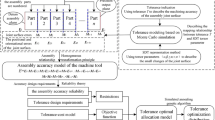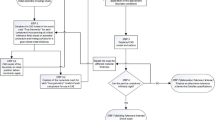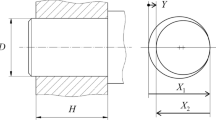Abstract
In this paper, a cost–tolerance model based on neural network methods is proposed in order to provide product designers and process planners with an accurate basis for estimating the manufacturing cost. Tolerance allocation among the assembly components is carried out to ensure that the functionality and design quality are satisfied considering the effect of dimensional and geometric tolerance of various components of the assembly by developing a parametric computer aided design (CAD) model. In addition, deformations of various components of mechanical assembly due to inertia and temperature effects are determined and the same is integrated with tolerance design. The benefits of integrating the results of finite element simulation in the early stages of tolerance design are discussed. The proposed method is explained with an application example of motor assembly, where variations due to both dimensional and geometric tolerances are studied. The results show that the proposed methods are much effective, cost, and time saving than the ones considered in literature.
Similar content being viewed by others
References
Zhang C, Wang B (1993) The discrete tolerance optimization problem. Manuf Rev 6(1):60–71
Al-Ansary MD, Deiab IM (1997) Concurrent optimization of design and machining tolerances using the genetic algorithms method. Int J Mach Tools Manuf 37(12):1721–1731
Chase KW, Greenwood WH, Loosli BG, Haugland LH (1999) Least cost tolerance allocation of mechanical assemblies with automated process selection. Manuf Rev 3(1):49–59
Dong Z, Hu W, Xue D (1994) New production cost–tolerance models for tolerance synthesis. ASME Trans J Eng Ind 116:199–206
Lee WJ, Woo TC (1989) Optimum selection of discrete tolerances. Trans ASME J Mech Trans Auto Des 111:243–252
Lee WJ, Woo TC, Chou SY (1993) Tolerance synthesis for non linear systems based on nonlinear programming. IIE Trans 25(1):51–61
Taguchi G (1989) Quality engineering in production systems. McGraw-Hill, New York
Chen RM, Chan WW (1993) Efficient tolerance design procedure for yield maximization using optimization techniques and neural network, in Proc. IEEE Int. symposiums on circuits and systems
Kopardekar P, Anand S (1995) Tolerance allocation using neural networks. Int J Adv Manuf Technol 10:269–276
Stern HS (1996) Neural networks in applied statistics. Technometrics 38:205–220
Chen MC (2001) Tolerance synthesis by neural learning and nonlinear programming. Int J Prod Econ 70:55–65
Lin ZC, Chang DY (2002) Cost-tolerance analysis model based on neural network method. Int J Prod Econ 40(6):1429–1452
Yang CC, Achutha Naikan VN (2003) Optimum design of component tolerances of assemblies using constraint networks. Int J Prod Econ 84:149–163
Liu SC, Hu SJ (1997) Variation simulation for deformable sheet metal assembly using finite element methods. Trans ASME J Manuf Sci Eng 119:368–374
Camelio JA, Hu SJ, Ceglarek DJ (2001) Modeling variation propagation of multi-station assembly systems with compliant parts, in Proc. DETC’01 ASME
Hu SJ (1997) Stream-of-variation theory for automotive body assembly. Annals CIRP 46(1):1–6
Ceglarek DJ, Shi J (1997) Tolerance analysis for sheet metal assembly using a beam-based model. ASME, Int Mech Engg Cong Expos, DE, 94:153–159
Hu M, Lin ZQ, Lai XM, Ni J (2001) Simulation and analysis of assembly process considering compliant, non-ideal parts and tooling variations. Int J Mach Tools Manuf 41:2233–2243
Hsieh CC, Oh KP (1997) A framework for modeling variation in vehicle assembly processes. Int J Veh Des 18(5):466–473
Sampers S, Giordano M (1998) Taking into account displacements in 3D tolerancing models and application. J Mater Process Technol 78(1):156–167
Liao X, Wang GG (2005) Employing fractals and FEM for detailed variation analysis of non rigid assemblies. Int J Mach Tools Manuf 45:445–454
Manarvi IA, Juster NP (2004) Framework of an integrated tolerance synthesis model and using FE simulation as a virtual tool for tolerance allocation in assembly design. J Mater Process Technol 150:182–193
Pierre L, Teissandier D, Nadeau JP (2009) Integration of thermo-mechanical strains into tolerance analysis. Int J Adv Manuf Technol 3(4):247–263
Jayaprakash G, Sivakumar K, Thilak M (2012) Tolerance design of mechanical assembly using NSGA II and finite element analysis. J Mech Sci Technol 26(10):3261–3268
Jayaprakash G, Sivakumar K, Thilak M (2012) A numerical study on effect of temperature and inertia on tolerance design of mechanical assembly. Eng Comput 29(7):722–742
Shen Z, Ameta G, Shah JJ, Davidson J, Davidson JK (2005) A comparative study of tolerance analysis methods. ASME J Comput Inf Sci Eng 5:247–256
Gao J, Chase KW, Magleby SP (1998) General 3-D tolerance analysis of mechanical assemblies with small kinematic adjustments. IIE Trans 30:367–377
Jeang A (1995) Economic tolerance design for quality. Qual Reliab Eng Int 11(2):113–121
Jeang A, Lieu E (1999) Robust tolerance design by computer experiment. Int J Prod Res 37(9):1949–1961
Author information
Authors and Affiliations
Corresponding author
Electronic supplementary material
Below is the link to the electronic supplementary material.
ESM 1
(XLS 87 kb)
Rights and permissions
About this article
Cite this article
Jayaprakash, G., Thilak, M. & SivaKumar, K. Optimal tolerance design for mechanical assembly considering thermal impact. Int J Adv Manuf Technol 73, 859–873 (2014). https://doi.org/10.1007/s00170-014-5845-0
Received:
Accepted:
Published:
Issue Date:
DOI: https://doi.org/10.1007/s00170-014-5845-0




